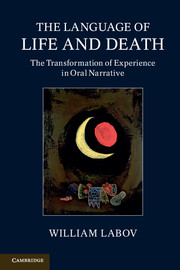Book contents
- Frontmatter
- Contents
- Preface
- Acknowledgments
- 1 Introduction to the language of life and death
- 2 Narrative analysis
- 3 The escalation of violence
- 4 Confrontations with death
- 5 Premonitions and communication with the dead
- 6 Margie Knott: “Her confrontation with the neighbors”
- 7 Gloria Stein: “They stoned the house”
- 8 Rose Norman: “The death of her younger sister”
- 9 Mary Costa: “The death of her youngest daughter”
- 10 Cache County
- 11 The vernacular origin of epic style
- 12 Historians' use of narrative
- 13 Thomas Babington Macaulay: “The death of Monmouth”
- 14 S. T. Bindoff: “The death of Elizabeth”
- 15 2 Samuel: “The death of Absalom”
- 16 The narrative view of death and life
- References
- Index
5 - Premonitions and communication with the dead
Published online by Cambridge University Press: 05 June 2013
- Frontmatter
- Contents
- Preface
- Acknowledgments
- 1 Introduction to the language of life and death
- 2 Narrative analysis
- 3 The escalation of violence
- 4 Confrontations with death
- 5 Premonitions and communication with the dead
- 6 Margie Knott: “Her confrontation with the neighbors”
- 7 Gloria Stein: “They stoned the house”
- 8 Rose Norman: “The death of her younger sister”
- 9 Mary Costa: “The death of her youngest daughter”
- 10 Cache County
- 11 The vernacular origin of epic style
- 12 Historians' use of narrative
- 13 Thomas Babington Macaulay: “The death of Monmouth”
- 14 S. T. Bindoff: “The death of Elizabeth”
- 15 2 Samuel: “The death of Absalom”
- 16 The narrative view of death and life
- References
- Index
Summary
In my New York City interviews, I followed up narratives of the danger of death by saying, “Some people say in a situation like that, ‘Whatever is going to happen is going to happen.’ What do you think?” Most people responded positively with expressions like, “Yes, I believe in fate,” or “That's the way the ball bounces,” “That's the way the cookie crumbles.” But a certain number took the opposite tack: “Well, I'm gonna be sure it doesn't happen.” This approach was gradually reshaped to a question on premonitions, so that its scope reached as wide a range of experience as possible: “Is there anyone in your family who gets a feeling that something is going to happen, and then it does happen?” In response, we obtain many accounts of older relatives who answer the telephone saying, “I had a feeling you were going to call,” accompanied by varying degrees of disbelief or skepticism. But along with such conventional premonitions, we receive accounts of a more complex nature, with evidence that is difficult to explain away or set aside. In many cases, these intimations of the future deal with death, or information that would seem to have come from the dead, especially those who have recently passed on. This chapter will deal with five such stories and the narrative devices that generate their interest and credibility.
Chapter 2 developed the principle that credibility is inversely related to reportability. A speaker who claims the floor for a narrative that is obviously false runs the risk of not only losing the floor, but also losing considerable face as an outcome. The audience for the narratives of this chapter will be sharply divided into two groups in their initial state of belief for events of this type. University people tend to be skeptical; most others are not. But the impact of the narratives is not much different for the two types of listeners. Many, like myself, retain their initial state of disbelief, and readily search for mechanisms of a natural order to explain what seems to be supernatural.
- Type
- Chapter
- Information
- The Language of Life and DeathThe Transformation of Experience in Oral Narrative, pp. 90 - 106Publisher: Cambridge University PressPrint publication year: 2013



